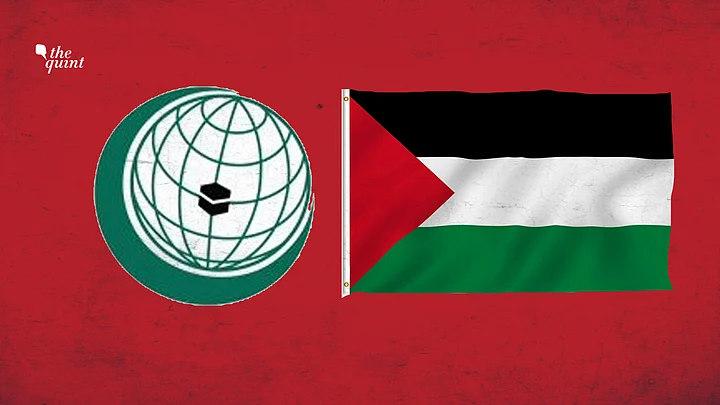The Abraham Accord has invoked strong reactions from across the globe. While some countries like Bahrain appreciated the peace agreement, most saw it as a betrayal of the Palestinian cause. Hoping to invoke Muslim solidarity, the Palestine Liberation Organization (PLO) has called for an Organisation of Islamic Cooperation (OIC) summit to reject this new development.
In a world where ideologies often get neglected in response to geo-political realities, is Palestine’s hope for Muslim solidarity realistic?
Muslim Unity & Genesis Of Organisation Of Islamic Cooperation (OIC)
The world has witnessed a lot of unrest in the Middle East since the dissolution of the Ottoman empire. Thus, the idea of Muslim unity seems strange. But the Arab and Muslim worlds have united to support each other whenever they have suspected a threat from the ‘other’ to themselves or their religion. A glaring example of this camaraderie is the solidarity of the Arab subcontinent towards the Palestinian cause.
The Israel-Palestine conflict is based on many factors such as ethnicity, history, nationality and religion, and has huge ramifications for world politics.
Many Arab countries like Egypt, Jordan, Iraq, Syria and Lebanon fought multiple wars – spanning over five decades – with Israel to defend the sanctity of Jerusalem, a holy site for both Judaism and Islam.
Muslim nations officially came together to form the world's largest religious organisation and second-largest intergovernmental organisation after the UN – the Organisation of Islamic Cooperation – in 1969. Disturbed by an arson attack on the Al-Aqsa mosque in Jerusalem, 24 Muslim-majority countries united to establish the OIC to condemn this act.
The organisation has since gradually grown to become the largest religious organisation in the world, with 57 member states, and boasts of being the collective voice of a fourth of the world’s population. Since its inception, the OIC endeavours to foster a global Islamic ummah, and promote and protect the rights of Muslims worldwide.
This universality in the organisation’s charter reflects its the ambition to represent not just the voices of the Arabs and Muslims from the Muslim-dominated nations, but also hold space for Muslims in non-Muslim majority countries.
In pursuit of this, the OIC acted as mediator in the peace process between the Government of Philippines and the Moro Muslim people, who had been in conflict for decades.
- The Abraham Accord has invoked strong reactions from across the globe.
- While some countries like Bahrain appreciated the peace agreement, most saw it as a betrayal of the Palestinian cause.
- Hoping to invoke Muslim solidarity, the Palestine Liberation Organization (PLO) has called for an Organisation of Islamic Cooperation (OIC) summit to reject this new development.
- The OIC has failed on both counts – as a collective voice of Muslims around the world, and in its treatment of minorities on its own soil.
- Palestine’s call for an OIC summit – to discuss the Abraham Accord – is unlikely to yield any real result.
OIC’s ‘Double-Standard’ On Muslim Rights
Muslim nations and the OIC expressed discomfort at what they perceived to be ‘obscene’ portrayals of Islam and the Prophet in the Charlie Hebdo comics and Salman Rushdie’s novels. Ironically, while the publication of (fiction) novels and cartoons invoke strong reactions and even legal action from Islamic nations, actual reports of suffering and institutionalised discrimination are swept under the carpet.
OIC’s hypocrisy in dealing with minority rights in Thailand and China has often been called out.
While OIC sees its intervention as a mandate in Thailand, it seems to be comfortable ignoring the same in China’s Xinjiang. The OIC’s eery silence on the persecution of Uighur Muslims in Xinjiang reinforces Fareed Zakaria’s thought that “foreign policy is a matter of cost and benefits, and not theology.”
As the world moves towards bi-polarity, countries are forced to pick sides. As for the Middle East, this choice is a fairly simple one.
On one hand, there is the United States that has contributed to instability in the region, imposed several trade sanctions with its diminishing interest in oil. On the other hand there is China, which has been a long term stable consumer of oil from the region and invested billions of dollars in ambitious infrastructure projects such as the Belt and Road Initiative (BRI).
How OIC Has Proved To Be ‘Ineffective’
At a regional level, the Sunni-Arab nations are gravitating towards Israel to forge economic and security ties in an attempt to halt Iran's regional hegemony. One can see the paradigm shift in the relations between the Arab states and Israel. While Israel does not hesitate to flaunt these new friendships, most countries in the Arab world want to keep it under wraps. It is interesting to see Saudi Crown Prince Mohammed bin Salman and other monarchs navigating the domestic Arab interests and the Palestinian cause.
The battle between ideology (support for the Palestinians) and politico-economical gains is playing out in the Middle East, and it seems likely that ideology will take a back seat.
The OIC has failed on both counts – as a collective voice of Muslims around the world, and in its treatment of minorities on its own soil.
China's economic, geo-political and financial status proved too tough for OIC members to uphold their charter. OIC’s reluctance to deal with the Rohingya crisis, and its silence on the persecution of Uighur Muslims in Xinjiang are disappointing and dispiriting. Thus, going by the trend, Palestine’s call for an OIC summit – to discuss the Abraham Accord – is unlikely to yield any real result.
(Sameera, a former Teach for India fellow, is presently an educator at Shiv Nadar School, Noida. She holds a BA LLB (Hons.) degree and a PGDM in International Law and Diplomacy. She is also a part of the founding cohort of the GPODS fellowship. This is an opinion piece and the views expressed are the authors’ own. The Quint neither endorses nor is responsible for them.)
